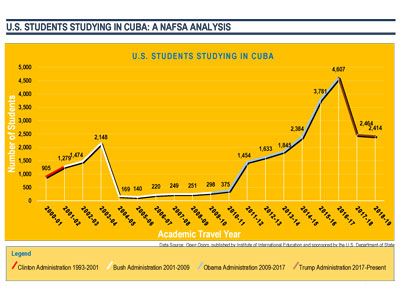U.S. academic travel to Cuba was decimated by severe executive branch directives in 2004. Consequently, most study abroad programs conducted by American institutions in Cuba shuttered, effectively abandoning one of the only avenues of understanding and collaboration that existed between our two countries.
The resulting 92% plummet in U.S. students studying in Cuba proved nearly fatal for Cuban exchange programs. The few programs that managed to remain open following the restrictions limped forward until January 2011, when NAFSA: Association of International Educators, the academic exchange community, and the larger coalition won a historic advocacy victory with the Obama Administration’s executive action to restore academic travel.
This action implemented through regulatory changes published by the Department of Treasury, allowed colleges and universities to restart their credit-bearing study abroad programs under a general license, restored licenses for people-to-people exchanges, expanded travel options for faculty and researchers, and more.
That policy shift, as noted in a Politico Pro story (‘Thaw in U.S.-Cuba relations opens door to study abroad, scholarly work’) was the most dramatic of several actions by the Obama Administration that have gradually made study abroad and scholarly exchange with Cuba more feasible.
The U.S. academic community rushed to reengage with Cuba, boosting student participation an astonishing 300%. It is important to note, however, that we have yet to realize parity with the number of students studying in Cuba prior to the 2004 restrictions. Ongoing restrictions to travel, banking, and other bureaucratic barriers that limit travel to one of only 12 acceptable travel categories hinder full resumption of study abroad programs and the opportunity to expand.
Even before the restrictions, study abroad in Cuba lagged considerably compared to other U.S. neighbors. Cuba remains low on the list of study abroad destinations for American students, with only 1,845 students studying there in 2014 - only six-tenths of a percent of the Americans studying abroad.
Despite the positive momentum toward the full restoration of diplomatic ties with Cuba, the travel ban and trade embargo still exist, making Cuba the only country in the world that the U.S. government prevents its citizens from visiting.
International educators believe the numbers will continue to grow as further actions to normalize relations happen, including the U.S. reopening its embassy in Havana last August. And later this month, President Barack Obama will become the first sitting American president to visit Cuba since Calvin Coolidge in 1928.
As the president prepares to make his landmark visit to Cuba and flights between the United States and Cuba set to resume, there is still much more work that needs to be done to normalize relations with the island nation. The current framework will only allow the Administration to proceed so far. Congress must take legislative action in order for the United States to fully restore relations with Cuba. It is time to end the U.S. embargo on Cuba. NAFSA and participating advocates will bring the issue to legislators’ attention during Advocacy Day 2016 (follow #nafsaAD for updates).
Throughout the year and election season NAFSA will continue to:
- Push Congress to fully remove all travel and trade restrictions by ending the travel ban and lifting the trade embargo
- Reverse decades of failed foreign policy and effectively re-engage with the Cuban people
- Facilitate sustainable partnerships between U.S. & Cuban academic institutions; encourage rich and meaningful educational opportunities and research collaboration
- Promote positive foreign policies and hemispheric relations
Travel is inherently educational. America benefits economically, academically, and diplomatically from visiting and knowing our neighbors around the world – including Cuba, which sits just 90 miles away.
NAFSA encourages you to get involved with the movement to engage with Cuba. Share your experience executing a study abroad program in Cuba, or what difficulties obstruct your ability to expand study abroad for your students by visiting www.nafsa.org/cubasurvey.

